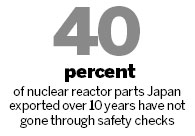Japan reactor parts lack safety checks, report says
Japan did not carry out safety checks on at least 40 percent of nuclear reactor parts exported over 10 years, a report said on Monday, in the latest controversy to strike its troubled nuclear industry.
Nuclear reactor parts - including pressure vessels that contain the fuel in power plants - worth about 51.1 billion yen ($520 million) were shipped to 18 countries and regions without undergoing safety checks, the Mainichi Shimbun newspaper reported.
Britain, Germany, Australia, Russia and Italy were among the countries that took delivery of the potentially unsafe equipment, the newspaper said, citing manufacturers and an industrial body among its sources.
Japan exported nuclear reactor parts worth 124.8 billion yen to more than 20 countries from 2003-12, the Mainichi Shimbun said, citing official trade figures.
But safety checks, entailing simple examinations of documents, were only required for exports tied to loans from the State-run Japan Bank for International Cooperation or guarantees by the public agency Nippon Export and Investment Insurance, the daily said.
The unchecked parts included control rod drives, which regulate the rate of nuclear fission, supplied to Sweden and Brazil, the newspaper said.
The rest of the exports are thought to have undergone government safety checks before being shipped to China, the United States, France, Belgium and Finland, the paper said, citing the country's Agency for Natural Resources and Energy.
But much of the data disclosed by the agency was blacked out, raising the possibility that those exports may also have been shipped without being checked, the paper said.
Safety has been a major concern for Japan's nuclear industry since a huge earthquake and tsunami ravaged the country's northeast coast and triggered a meltdown at the Fukushima nuclear power plant in March 2011.
But Japan has continued overseas sales of nuclear reactor technology, with Prime Minister Shinzo Abe assuring buyers that the industry is among the world's safest.

Nuclear power is set to remain a key part of Japan's energy profile despite the safety concerns raised by the Fukushima disaster, senior Japanese energy officials predicted on Monday.
"The Japanese government still considers nuclear as an option for the energy mix. It must not be excluded from the overall energy mix," said Zengo Aizawa, vice-president of Tokyo Electric Power Co, which operates the Fukushima plant.
"The government has rethought the idea of abandoning nuclear energy," Aizawa told a session of the World Energy Congress in Daegu, South Korea.
Japan shut down all 50 commercial reactors after the 2011 earthquake and tsunami.
Two were restarted in July last year, but were taken offline again last month for inspections, leaving the country without any nuclear power.
(China Daily 10/15/2013 page11)


















